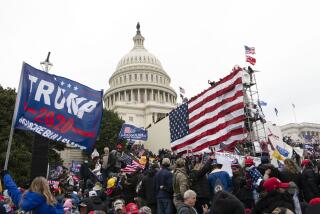Pledge of Immunity Doesn’t Shield Tripp, Judge Rules
- Share via
ELLICOTT CITY, Md. — Linda Tripp suffered a major setback Tuesday in her battle to clear herself of wiretapping charges, as a judge ruled that former independent counsel Kenneth W. Starr’s promise of immunity does not stop Maryland authorities from prosecuting her.
Lawyers for Tripp, who is facing a felony trial in January on charges that she illegally taped her phone conversations with former White House intern Monica S. Lewinsky, tried to show that Tripp was protected from prosecution by an immunity deal she struck with Starr’s office in January 1998 on the same day she turned over her Lewinsky tapes to the independent counsel.
But Howard County Circuit Court Judge Diane Leasure was not swayed. State prosecutors convinced her that Tripp’s immunity protection did not take effect until more than a month later, when a federal judge approved it.
The timing is critical because Maryland prosecutors must demonstrate at a pretrial hearing continuing through the week that their investigation into the wiretapping allegations against Tripp was conducted independently and was not influenced or tainted by Starr’s inquiry. Maryland authorities say that news accounts in late January and early February of 1998--before Tripp’s court-ordered immunity--triggered their investigation into her phone recordings.
Maryland State Prosecutor Stephen Montanarelli, who headed the Tripp investigation, testified at Tuesday’s hearing that state authorities uncovered evidence on their own indicating that Tripp knew she was illegally taping her calls with Lewinsky, who discussed her affair with President Clinton in the conversations, and that Tripp was even gossiping to her bridge partners about it.
“This was a topic at their bridge parties on a regular basis,” Montanarelli said.
One bridge partner even asked if such taping was legal in Maryland after she saw Tripp changing the batteries on her tape recorder, he said. Tripp reportedly answered: “No but nobody ever gets prosecuted,” Montanarelli testified. Maryland requires the consent of both parties on the line before a phone call can be taped.
Tripp did not attend Tuesday’s hearing. But one of her defense lawyers, Joseph Murtha, said outside court that he doubts the bridge club story is true. And in cross-examination of Montanarelli, Murtha sought to show that the prosecutor’s investigation had been infected by the massive publicity surrounding the Lewinsky scandal after it broke publicly in January, 1998.
Montanarelli testified that he and his assistants went to great lengths to insulate themselves and the grand jurors who returned an indictment against Tripp this summer from having any direct exposure to the Starr investigation.
The prosecutor said that he has made it a point not to listen to the Lewinsky tapes himself to avoid any risk of contaminating his investigation. And he said that he never read Starr’s massive report, which came out in the fall of 1998, and that he instructed his staff not to do so either. He acknowledged that a researcher read parts of the report anyway.
“What I should have done was destroyed [copies of the report] or put them under lock and key,” Montanarelli said. “But I didn’t do that.”
In tough questioning, Murtha asked whether grand jurors and/or witnesses in the Tripp investigation would not inevitably have mixed up their own independent assessments of the case with information that they had picked up amid the torrent of publicity about the Clinton-Lewinsky scandal.
“That may be true, but we asked them” to not do that, Montanarelli answered.
Judge Leasure noted from the bench that, if Maryland authorities hope to take the case against Tripp to trial, they have a “heavy burden” to meet in showing that their investigation was built independently of Starr’s inquiry.
But Maryland prosecutors could at least claim victory for Leasure’s decision on the complicated immunity issue.
Leasure noted in her ruling that Maryland authorities were never involved in any of the discussions or decisions that led to Starr’s grant of immunity to Tripp. And she said that, while it was a technicality that delayed Tripp’s court-ordered immunity from taking effect until a month after she handed over the tapes to Starr’s office, it was “a technicality that certainly has significance” under Maryland state law.
“Obviously we’re very pleased with the court’s decision,” Montanarelli said outside the court, adding that he had worried Leasure might rule in Tripp’s favor. “There’s always that chance. . . . I’m always worried,” he said.
Attorneys for Tripp said they were disappointed by the ruling but promised a tough legal fight in what they called a “war of attrition.”
Testimony continues today on the question of whether outside publicity influenced Maryland’s investigation.
Prosecutors refused to say whether Lewinsky would testify on Thursday, as has been rumored. “I’ll get to that,” Montanarelli said.
More to Read
Sign up for Essential California
The most important California stories and recommendations in your inbox every morning.
You may occasionally receive promotional content from the Los Angeles Times.













